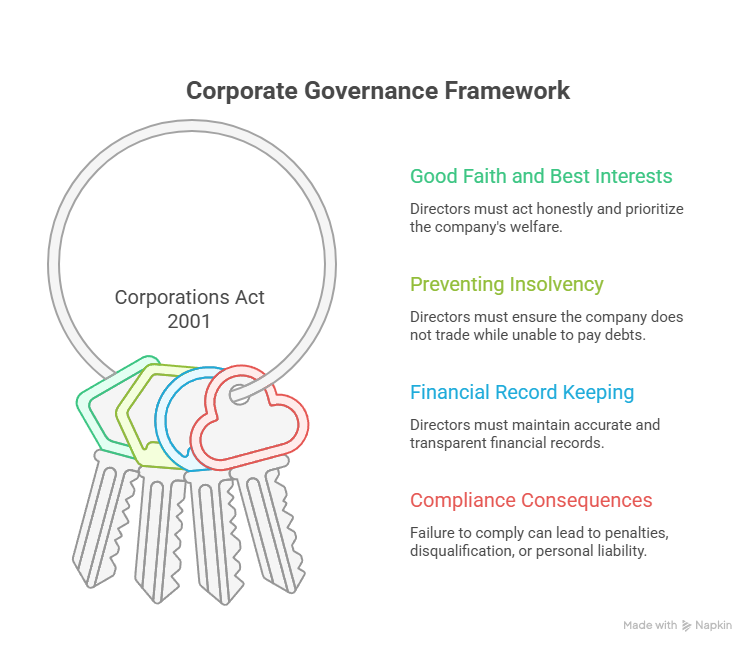Learning how to set up a company in Australia can be a rewarding move for your business, offering advantages like limited liability and greater credibility. Unlike operating as a sole trader, a company is a separate legal entity with distinct tax and reporting obligations. If you’re considering this structure, it’s important to understand the key steps and ongoing compliance duties involved.

In this guide, we’ll explain how to set up a company in Australia and what you need to do to stay compliant.
1. Prepare to Register Your Company
Before lodging your application with the Australian Securities and Investments Commission (ASIC), ensure you have the following items ready:
Choose a Unique Company Name
Your company name must not be identical to an existing registered business. It must include a legal status indicator like “Pty Ltd” to signify limited liability. You can check name availability through ASIC’s online register.
Appoint Directors and Shareholders
You must appoint at least one director who is an Australian resident. You can have one or multiple shareholders, and you’ll need to decide how to allocate the company’s shares.
Obtain a Director ID
Every director must apply for a Director Identification Number (Director ID) before being appointed. This is a one-time process and helps track directors’ records across companies.
Provide an Australian Address
You must have a registered office address (not a PO box) and a principal place of business located in Australia. This is where ASIC will send official correspondence.
2. Register with ASIC and Get an ACN
Once prepared, you can register the company with the Australian Securities and Investments Commission (ASIC). This is typically done online via the Australian Government’s Business Registration Service. You will need to pay a registration fee (around a few hundred dollars for a small proprietary company). After completing the application, ASIC will issue a Certificate of Registration and an Australian Company Number (ACN). The ACN is a unique 9-digit identifier for your company, and it must appear on official company documents and invoices.
Note: You cannot obtain an Australian Business Number for the company until it has an ACN. The Australian Taxation Office (ATO) advises that you need to register the company (and get an ACN) before applying for an ABN and tax registrationsato.gov.au.
3. Apply for an ABN and Tax Registrations
After receiving your ACN, your next step is to apply for an Australian Business Number (ABN). The ABN is an 11-digit number used for business dealings and tax purposes.
How to Apply:
You can apply for an ABN:
- During company registration (in the same session)
- Or later via the Australian Business Register (ABR) website
When applying, you’ll need:
- Your ACN
- Business activities and contact information
Tax Registrations to Consider:
- GST: Required if your turnover is expected to exceed $75,000 annually. You’ll charge 10% GST on sales and can claim input credits.
- PAYG Withholding: If you hire employees or pay directors, you must withhold income tax and remit it to the ATO.
- Business Name: If your trading name differs from the registered company name, register the business name with ASIC after receiving your ABN.
Tip: You can complete most of these registrations in one session during your initial setup.
4. Meet Ongoing Compliance Obligations
Setting up a company is just the beginning. You’ll have several legal and tax obligations to maintain throughout the life of the business.
Lodge an Annual Company Tax Return
Each financial year, your company must submit a company tax return to the ATO. This includes your income, deductions, and the corporate tax payable. Small businesses currently pay a corporate tax rate of 25%.
Submit Business Activity Statements (BAS)
If your company is registered for GST, you’ll need to lodge BAS quarterly or monthly, depending on turnover. This allows you to report and pay GST and PAYG withholding.
ASIC Annual Review
Every year, ASIC will send an annual review package on the anniversary of your registration. You must:
- Confirm or update company details
- Pay the annual review fee
- Keep your company information accurate
You must notify ASIC of any changes (e.g., directors, addresses) within 28 days to avoid penalties.
Keep Proper Financial Records
Your company is legally required to:
- Maintain accurate and up-to-date financial records
- Record all transactions, assets, and liabilities
- Retain records for at least 7 years
5. Understand Director Duties Under the Law
All company directors must comply with the Corporations Act 2001, which sets out legal obligations such as:
- Acting in good faith and in the best interests of the company
- Preventing the company from trading while insolvent
- Ensuring proper financial records are kept

Failure to comply can result in penalties, director disqualification, or even personal liability.
6. Consider Professional Help
Managing tax obligations, ASIC filings, and financial statements can be complex. Many business owners choose to engage a registered tax agent or accountant to:
- Lodge company tax returns and BAS
- Handle payroll and PAYG
- Ensure legal compliance with ASIC and the ATO
Setting up a strong accounting system early—whether with software or a professional—helps avoid future headaches.
Recap: Checklist for Setting Up a Company in Australia
- Chosen a unique company name
- Appointed directors and shareholders
- Applied for Director ID
- Prepared a registered office and business address
- Registered the company with ASIC and received your ACN
- Applied for an ABN and relevant tax registrations
- Registered a business name (if applicable)
- Set up bookkeeping systems and engaged professional support (optional)
- Understood ongoing obligations (tax, ASIC, records)
For a more detailed breakdown of the company registration process and compliance considerations, see Setting Up a Company in Australia: Requirements and Process or contact us for a chat. Establishing your company correctly from the start will help avoid costly mistakes and non-compliance down the line.
General information only – seek professional advice before acting.




